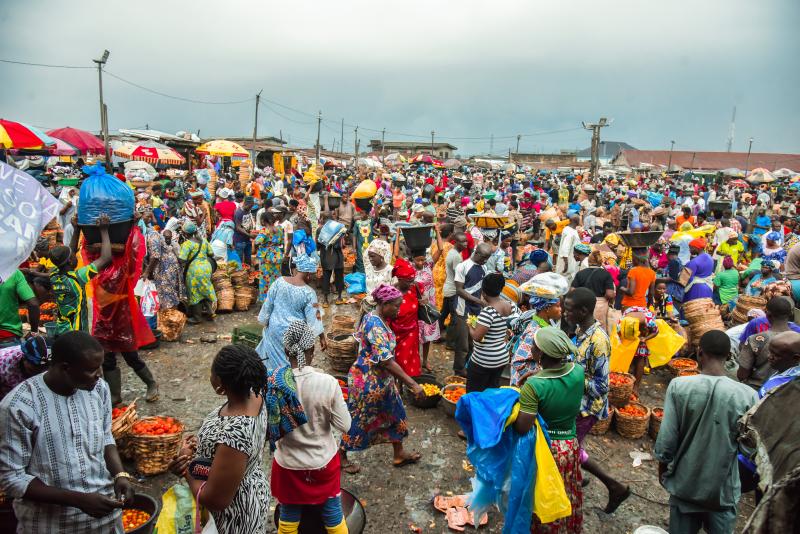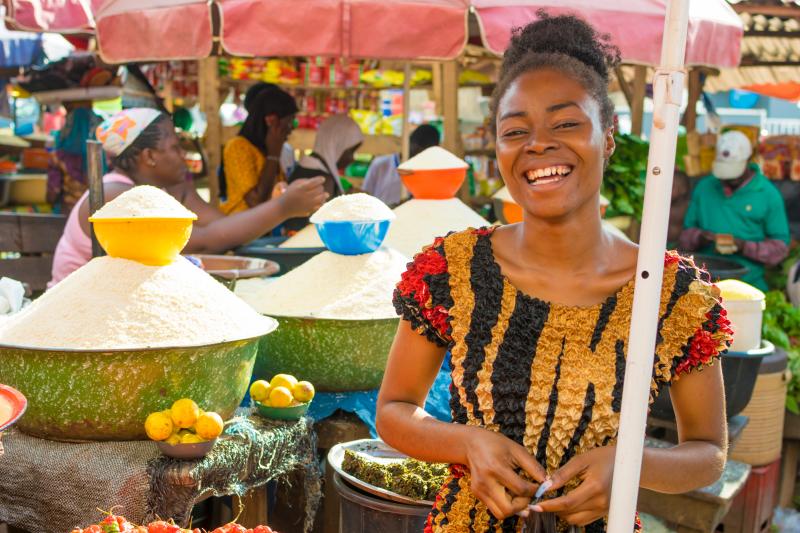Nigeria is one of the most densely populated countries in the world. With an estimated 90 million people under the age of eighteen in 2019, the country is home to the third largest youth population after India and China. According to the 2020 Global Nutrition Report, Nigeria faces a double burden of obesity and underweight. The national prevalence of under-five stunting is 37%, which is significantly greater than the developing country average of 25%.
Nigeria’s under-five wasting prevalence of 7% is also lower than the developing country average of 8.9%.An estimated 6.3% of adult men have diabetes, compared to 6% of women. Although still relatively low, obesity levels are rising in both children and adults: 13.1% of women and 4.6% are now considered obese.
 Michael Ojo is GAIN Country Director for Nigeria. We spoke to him from his home in Abuja, the country’s capital.
Michael Ojo is GAIN Country Director for Nigeria. We spoke to him from his home in Abuja, the country’s capital.
What brought you to the food systems, food security, public health along with nutrition?
Malnutrition is such a widespread problem in Nigeria that one barely notices it anymore. One of the things I keep thinking of is my childhood: we had chickens, there were fruit trees and access to vegetables. Nowadays you don’t see chickens, you don’t see goats wandering around. People have to buy their food now: they can’t rely on being able to grow it. This may be one of those things you see as a country transitions from low- income to middle-income. It underlines why the food system is so critical in countries like Nigeria, where the vast majority of people buy the food they consume.
What do you see as the biggest issues facing the country from a nutritional point of view?
One of our biggest challenges is that we have so many people to feed. The population of Nigeria is predicted to grow to 400+ million by 2050 and that, from a nutritional point of view, is a big but not insurmountable problem. The population is growing way faster than the capacity of our food systems to feed them. The other is the rise in urbanisation at a rate of 4% per year. Many young people are not finding agriculture attractive. Since we depend on smallholder farmers, this means that as our population grows, our capacity to produce good food for all falls behind.
Another big issue for Nigeria is that we are consuming a very narrow range of foods, consisting mainly of starchy tubers and grains. We are not producing enough nutrient-dense foods such as fresh leafy greens, fruits or animal-sourced foods like fish, eggs and meat. On top of that, the very little that we produce is not getting to market because of poor infrastructure. Too many people are not able to afford or access, high quality diets. This is connected to high prices of nutritious foods as well as poverty as people cannot choose to buy good food.
We see the impact of this lack of diet diversity manifest as different forms of malnutrition from stunting in children to micronutrient deficiencies in women of reproductive age. Overweight and obesity is becoming more and more of a problem especially in adult women. Consequently, we are sitting on a demographic timebomb where the large population becomes more of a burden than an asset. Malnutrition in all forms is affecting the capacity of our children to learn and thrive; it is impacting the potential and productivity of our youth; it is increasing the health burden on the entire population and threatening economic viability and the very future of the country.

Where are you seeing success in tackling malnutrition in your country?
Food fortification is one of our success stories in terms of GAIN’s impact on the development of a national fortification programme. As typical Nigerian diets are not very diverse, we’re working with government and the business sector to add nutrients and micronutrients by fortifying edible oils, maize flour and wheat flour—the foods that most people eat.
Over time, as the focus of our interventions have shifted to diet quality and diversity, we have moved from a health system to a food systems focus. We are working to support the system to produce the nutritious foods we need; to ensure that the food is processed in such a way as to retain its nutritional value. We are looking at the movement of these foods through supply chains so that they actually get to market and to the plates of those who need it most.
One of the real successes has been reducing post-harvest losses, a big issue in Nigeria where we see up to 40% losses between the farm gate and markets for some fresh fruits and vegetables. We’re working with businesses in post farm gate processing, food logistics, retailers and others to implement simple interventions to ensure that more perishable, nutritious foods make it onto the plate at lower prices. This of course involves working with farmers to ensure that there is cold storage from the farm right through to the market. GAIN also works with governments to influence policies on post-harvest losses and actions around taxation, tariffs and transport logistics to ensure that the system is working.
A thread that runs through our work is what we do with small and medium sized enterprises (SMEs) – how to best support them with access to financing, how to scale their businesses and other interventions to keep our food systems working. We focus on supporting nutritious food SMEs which struggle to find the financing they need to make investments in their businesses. Through our NutriPitch initiative , we have directly supported over twenty SMEs with capacity building and technical assistance to make them investor ready, help them access suitable financing, and bring their operations to scale for the Nigerian market.

Why is it important to focus on women and girls?
Nearly 60 percent of women of reproductive age have anaemia in this country. In Nigeria, women and girls do not have access to the same opportunities as men have. In a typical household, when it comes to decisions about who gets what in terms of access to foods, it is usually the women and girls who lose out. It is critical for access to nutritious foods to be more equitable between males and females. We need to prioritise women and girls because it not only benefits their health and future, but also the entire community, their families, and also men. In our programming, we’re not only reaching out to women and girls, but we are also trying to help men understand the importance of gender equality.
We try to do this in different ways. For example, women have a much harder time accessing finance. Typically, those who benefit from programmes that are not tailored are those that have the money, the voice and the agency—most often men. By targeting our support to SMEs through our work in the Scaling-Up Nutrition (SUN) Business Network (SBN) or via programmes to support the marketplace for nutritious foods, we can specifically focus on women owned or women-led SMEs or those employing a majority of women.
How are you adapting programming to the COVID-19 crisis? What are the opportunities and the long-term concerns?
Even before the pandemic, progress on nutrition targets was slow. COVID-19 has in effect rolled back the hard-won successes of recent years. We now expect to see significant increases in the numbers of malnourished and nutrient deficient children and adults across the board. We see food prices inflation at up to 30% year-on-year compared to 2019. These are big shocks and even more so for a country where half of its population already live below the poverty line. Even before the pandemic, we had issues with food supply chains. Military roadblocks and unrest accompanying the pandemic have only made the situation worse.
GAIN has had to do a great deal to modify our programmes including starting the Keeping Food Markets Working project. We’re working with government, the private sector and SMEs to provide them with emergency grants and the technical assistance necessary to ensure that they can continue to run their nutritious food businesses.
As we face the challenges, we are also collaborating with SMEs to seize opportunities such as developing new ways of managing and shortening supply chains to be more shock resistant. We are also looking at new opportunities to expand markets by working with the private sector to assist them with everything from the digitization of their stock ordering/control and their marketing.
Get Involved:
- Find here Nigeria’s country nutrition profile by the Global Nutrition Report
- Learn more about GAIN’s work in Nigeria
Photo credits: Photo of Michael Ojo: (C) GAIN. Photo of Woman at Market: (C) Shutterstock/I_am_Zews.







